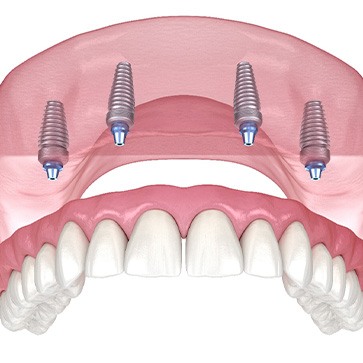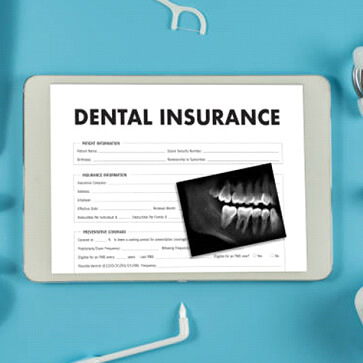Dental Implants – Vero Beach, FL
Long-Lasting, Natural-Feeling Replacement Teeth
Of all the options you have for replacing your missing teeth, dental implants are by far the most lifelike. While dental bridges and dentures can be designed to mimic the appearance of your original teeth, dental implants take it one step further by also feeling as if you’d never lost any teeth in the first place. They can also last much longer than other tooth replacements. We’re able to perform every step of the dental implant process here at Cromer & Cairns Dental, so call us to schedule your initial consultation with Dr. Julie Cromer for dental implants in Vero Beach!
Why Choose Cromer & Cairns Dental for Dental Implants?
- FREE Dental Implant Consultation
- Entire Dental Implant Treatment Completed In-House
- On-Site Dental Lab for Convenient, Customized Prosthetics
What Are Dental Implants?

Simply put, dental implants are small posts that replace the roots of your lost teeth. These posts can be made from various biocompatible materials, but we prefer zirconia. After the implants are surgically placed into the jaw, they bond to the surrounding bone tissue, creating a firm foundation that can support any number of prosthetic teeth for many years (if not decades or a lifetime) to come.
The 4-Step Dental Implant Process

As one of the most sought-after and effective ways to replace lost teeth, dental implants generally involve a multi-step process to ensure that your results are of the highest quality. Our team also works closely with our trusted local periodontist for the placement procedure, that way you have the best chance of a successful treatment. We’ll be sure to walk you through the entire dental implant process before your appointment, that way you know what to expect when recovering from surgery. Until then, here are the main four stages that you’ll undergo when replacing your missing teeth with titanium posts.
Initial Dental Implant Consultation

You’ll first visit Dr. Cromer for your initial consultation, which will involve a review of your dental and oral history to determine if dental implants will be a good fit for you. Not only will we evaluate your gum health and jawbone density, but we’ll also need to verify that you’re free of any existing problems that could risk failure later on, such as decay and periodontal infection. If necessary, we may have to schedule you for preliminary services like gum disease treatment, bone grafting, or tooth extractions. Once we’ve confirmed that there aren’t any complications that could interfere with your dental implants, we can move forward with your procedure.
Dental Implant Surgery

Dr. Cromer partners with an expert periodontist, Dr. Justin Schwartz, who will come to our office to perform your surgical portion of the treatment plan. During your appointment, we’ll administer a local anesthetic so that you’re entirely pain-free throughout the procedure. After verifying that you’re safe and comfortable, Dr. Schwartz will make a small incision in your gums so that he can carefully position your metal posts into your jawbone. Then, he’ll suture the tissue closed around the implants before placing a protective cap above the posts so that they remain safe during your healing process.
Dental Implant Osseointegration & Abutment

Once you’ve completed your surgical appointment, you’ll need around three to six months to recover while your dental implants undergo a process called osseointegration, which is when the posts fuse with your jawbone tissue. This is what will create the strong and stable foundation that can allow your future restoration(s) to remain in place for decades or even a lifetime.
After osseointegration is completed, you’ll return to us to receive your abutments—small metal connector pieces that will link your future restoration/prosthetic to your implants. Then you’ll be sent back home for your gums to heal.
Delivery of Dental Implant Restoration(s)

During your final appointment, after verifying that your gums are healthy, we’ll finally have your crown, bridge, or denture fitted to your implants. Our team will double-check that your bite is perfect and that you’re satisfied with the results before sending you on your way to enjoy your newly rebuilt smile.
Benefits of Dental Implants

Dental implants are the only tooth replacement option out there that replaces the roots of the missing teeth – not just the chewing surfaces. This technique allows for all sorts of additional benefits that you can’t find elsewhere. Continue reading to learn about some of the advantages you can experience by opting for dental implants to replace your missing teeth.
Day-to-Day Benefits

Dental implants feel and look just like teeth, so you shouldn’t even notice a difference in your everyday life. Here are some of the benefits that you can experience daily:
- Bite Force: Thanks to the added stability of dental implants, you can eat anything you’d like – including tougher foods. Implants can restore upwards of 90% of your bite force.
- Easy Maintenance: Caring for dental implants is just like caring for natural teeth. Brush twice, floss, and rinse with mouthwash daily.
- Increased Confidence: Dental implants blend in seamlessly with the rest of your smile, so it will look like you have your natural teeth back!
Health Benefits

In addition to daily benefits, your health will be positively affected by your dental implants. Here are some health benefits that you can enjoy:
- Improved Oral Health: Dental implants help to prevent additional oral health issues from arising, including gum disease and further tooth loss.
- Improved General Health: Having excellent oral health will positively influence your general health. It lowers your risk of serious medical issues, including diabetes and cardiovascular disease.
- Prevents Bone Loss: Dental implants stimulate the jawbone. This will help to prevent bone loss from occurring over time.
Long-Term Benefits

When you choose dental implants, you are making an investment in the future of your smile. Here are some of the benefits that you can enjoy for many decades down the road:
- Long-Lasting: The implant posts can last for decades at a time. Many patients enjoy them for the rest of their lives!
- Successful: Dental implants have an amazing success rate of over 95%! Dental implant failure is highly unlikely.
- Save Money: You don’t have to worry about buying adhesives or soaking solutions when you have dental implants. They also don’t require frequent repairs and replacements. Dental implants also help to reduce your risk of additional oral health issues, saving you time, discomfort, and money.
Who Dental Implants Can Help

Dental implants can bring back any number of lost pearly whites, making practically any healthy adult with missing teeth a good candidate. So, if you are missing one tooth, you don’t have any of your natural teeth left, or you’re somewhere in between, don’t hesitate to schedule a consultation with us! You can also read on to learn more on the topic in the meantime, starting with the qualities that we look for during the consultation.
Who Is a Good Candidate for Dental Implants?

During your consultation with Dr. Cromer, she will review your dental and medical history, review your latest X-rays, and complete a visual exam to determine:
- If your jawbone is strong enough to support dental implants
- If your gums are healthy
- If any preliminary treatments are needed, like an extraction
- If you’re committed to taking good care of your smile
- If you’re willing to break bad habits, like smoking
Once Dr. Cromer has confirmed you’re eligible for dental implants and determined the number of teeth you’re missing, she can plan out your treatment accordingly.
Missing One Tooth

In order to replace a single missing tooth, we first need to insert the dental implant in the jawbone. Once the two have fused together (a process known as “osseointegration”), we will secure a dental crown on top. Since the restoration is custom-made to suit your unique dental needs, face shape, and aesthetic goals, it will blend in with the nearby teeth seamlessly, ensuring no unwanted attention is drawn to your smile.
Missing Multiple Teeth

If you’re missing several teeth in a row, then all it takes is just two implants (each one placed at one end of the gap) to support a dental bridge. This state-of-the-art tooth-replacement solution far exceeds its traditional counterpart in durability, stability, and longevity. Plus, implant bridges don’t rely on your natural teeth, so they’re the healthier and more conservative choice for your smile as well.
Missing All Teeth

Oftentimes, patients who are missing all of their teeth assume they have one choice: traditional dentures. The truth is that dental implants are often an option as well! If we decide together that this is the best smile-rebuilding solution for you, then we will place 4-6 dental implants strategically throughout your jaw. Then, we will secure a custom denture on top, effectively restoring the strength of your bite and the appearance of your smile in the process.
Understanding the Cost of Dental Implants

Replacing your missing teeth with dental implants doesn't have to cost you an arm or a leg. Various factors affect the cost of dental implants in Vero Beach, but they are the most affordable solution overall. Our office offers various financial options to keep a complete smile within your budget. We will create a personalized estimate and a member of our dental team will explain the fees, so you'll know exactly what you'll have to pay before committing to anything.
Preliminary Treatments & Dental Implant Surgery

You don't have to pay for the entire procedure all at once. Replacing a lost tooth with a dental implant requires several steps that can take many months. You can pay for each phase of your treatment separately. Although every situation differs, you can expect your estimate to include:
- Consultation: You'll require a visual examination and your dentist will review a CT scan of your oral structures to ensure you're a candidate for dental implants.
- Preliminary Treatments: It's not unusual to require a little prep work before your placement surgery, like tooth extractions, gum disease therapy, or bone grafting.
- Placement Surgery: Sedation or anesthesia will be used to keep you comfortable while your implant dentist in Vero Beach surgically places posts into your jawbone to serve as new tooth roots.
The Parts of Your Dental Implant

In addition to each step of your treatment plan, you'll also need to pay for your dental implant, which involves 3 components:
- Implant Post: Titanium posts are placed into your jawbone to act as new tooth roots.
- Abutment: Each implant post will require an abutment, which is a special feature to connect your restoration.
- Restoration: Depending on the number of teeth you are missing, you'll require either a dental crown, bridge, or denture.
How Dental Implants Can Save You Money

Dental implants are the most cost-effective solution for treating tooth loss because they have over a 95% success rate and are proven to last for 30 years or longer with the right care, like brushing and flossing. You'll never have to budget for replacements. Not to mention, dental implants also improve your oral health, so you're less likely to need costly procedures later. You may pay more initially, but dental implants will help you save money down the road.
Does My Dental Insurance Cover Dental Implants?

Your dental insurance may pay some of the expenses for certain steps in your treatment, like your consultation, diagnostic services, and preliminary procedures. After meeting your annual deductible, your dental insurance may cover some of the expenses for your restoration. We will work on your behalf with your dental insurance to maximize your benefits to lower the amount you will pay out-of-pocket.
Making Dental Implants Affordable

Our office offers many solutions to keep dental implants in Vero Beach affordable for everyone, including:
- Traditional Payments: We accept all traditional payment methods, including cash, credit cards, and checks, for your convenience.
- CareCredit Financing: Based on your credit approval, you can benefit from little or no interest in financing. You can pay any out-of-pocket expenses using a monthly payment plan.
- In-House Membership Plan: By joining our in-house membership plan, you can benefit from discounted services.
Dental Implant Post-Op Instructions

Now that you’ve had your dental implants placed, it’s time for the recovery process. But don’t worry, below, we’ll let you know what to expect, including what types of symptoms are normal, and how you can help your smile heal. Should you ever experience any intense, abnormal pain or other strange side-effects that aren’t mentioned here, please don’t hesitate to contact us for guidance.
What to Do Directly After Dental Implant Surgery

Immediately following your dental implant surgery, your biggest priority is to leave the forming blood clot in your implant site untouched so that healing happens smoothly. To ensure this occurs, be sure to follow these important rules:
- Do not spit. Wipe your mouth with tissues or swallow saliva.
- Do not use drinking straws.
- Do not smoke for at least the first day, but preferably two months or longer.
- Do your best to keep fingers and tongue away from the surgical site(s).
Common Side-Effects When Recovering from Dental Implant Placement

It is perfectly normal to experience some side-effects, especially in the first few days after your dental implant placement. These may include:
- Intermittent bleeding, which can be lessened by gently biting on gauze or applying light pressure. This may go on for multiple days.
- Swelling over the first 72 hours which could last over a week. Apply cold or warm compresses to the face over the surgical site(s).
- General discomfort is also normal. You can take either prescription or over-the-counter pain relievers to help.
Each of these side effects should be temporary and should gradually subside with time. If this is ever not the case, please let us know.
Your Diet After Dental Implant Surgery

In the first few days following your dental implant surgery, we recommend eating a softer, non-abrasive diet, including the following:
- Mashed potatoes
- Yogurt
- Ice cream
- Pudding
- Soup (not extremely hot)
- Scrambled eggs
- Pasta
You may return to a normal diet as soon as you feel up to it; however, we recommend limiting overly crunchy or tough foods for as long as possible and avoiding directly chewing on your implant site(s).
Post-Op Health & Oral Hygiene

- In the initial days following your dental implant surgery, it is fine to brush your teeth as usual; however, be sure to be very careful near the surgical sites.
- Rinse your mouth two or three times a day (ideally after meals) with warm saltwater. You can also use a prescription mouthwash if you have it.
- Be sure to avoid mouthwashes that contain high levels of alcohol such as Scope or Listerine.
What to Do After Your New Teeth Are Attached
The great news is that the hardest part of treatment is behind you! When your new crown, bridge, or denture is attached to your implant(s), you may experience some minor, temporary sensitivity in the gum tissue. Thankfully, this is very easy to control with over-the-counter pain medication. At this stage, there should be no swelling, bleeding, or extensive recovery. In fact, you should be ready to show off your brand-new smile the very same day!
Dental Implant FAQs

Tooth loss can be detrimental to your life, but it doesn’t have to be that way forever. At Cromer & Cairns Dental, we offer dental implants to help restore a complete and fully functional smile. Of course, even after reading the information above, it’s completely normal to have questions about the process before moving forward with it. For your convenience, we’ve compiled answers to some frequently asked questions below. Should you not find what you’re looking for, don’t hesitate to contact us for personal assistance!
How Long Do Dental Implants Last?
On average, dental implants can last 30+ years. However, that’s contingent upon the patient's health and lifestyle choices. To maximize the longevity of your new smile, you need to maintain a daily oral hygiene routine that includes brushing, flossing, and rinsing with an ADA-approved mouthwash.
Visiting your dentist regularly for checkups and cleanings is also crucial. It’s strongly advised that you refrain from chewing on excessively hard or sticky substances, and avoid using teeth as tools. Compared to traditional solutions like bridges and dentures, implants often have a much longer lifespan.
Does Getting Dental Implants Hurt?
It shouldn’t! Before the procedure begins, your mouth will be numbed using a local anesthetic. The jawbone contains minimal nerve endings, reducing the likelihood of sensation. Additionally, you will likely receive sedation, which diminishes your body's pain perception.
While the surgery itself should be painless, you will likely experience some soreness in your mouth for a few days following the procedure. You can manage it by taking prescribed or over-the-counter pain medication. Applying cold compresses can also provide relief. If the discomfort worsens instead of improving after two or three days, let us know!
What Can Cause Dental Implants to Fail?
Although it’s rare, dental implant failure generally occurs due to one of two reasons: peri-implantitis or failed osseointegration.
Peri-implantitis is a gum disease that occurs due to inadequate oral hygiene, leading to damage to the bone and gums that support the implant. In some cases, the implant may fail to integrate with the jawbone, especially if the patient initially had low jawbone density.
Other potential causes of dental implant failure include chronic teeth grinding, tobacco usage, poor oral hygiene, certain medications, certain health conditions (i.e., diabetes, cancer, osteoporosis, autoimmune disorders), and more. Rest assured – we will provide you with guidelines to minimize the risk of implant failure.
Is There Anything I Shouldn’t Eat with Dental Implants?
For the first few weeks following surgery, you should steer clear of hard-to-chew foods and avoid consuming alcoholic, sugary, or acidic beverages. Do not use a straw!
Once you recover, you’ll be able to enjoy a wide range of foods similar to what you could eat with natural teeth. However, exercise caution with certain foods (such as chewy or sticky candies) as they have the potential to loosen or dislodge your restoration.
